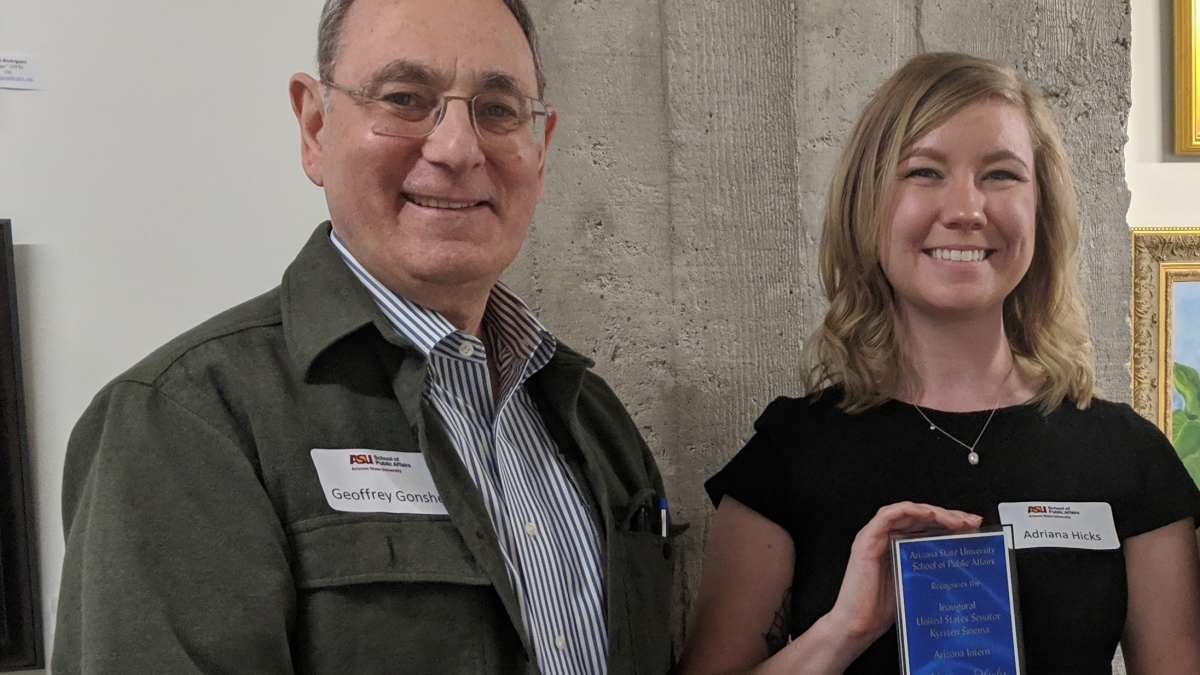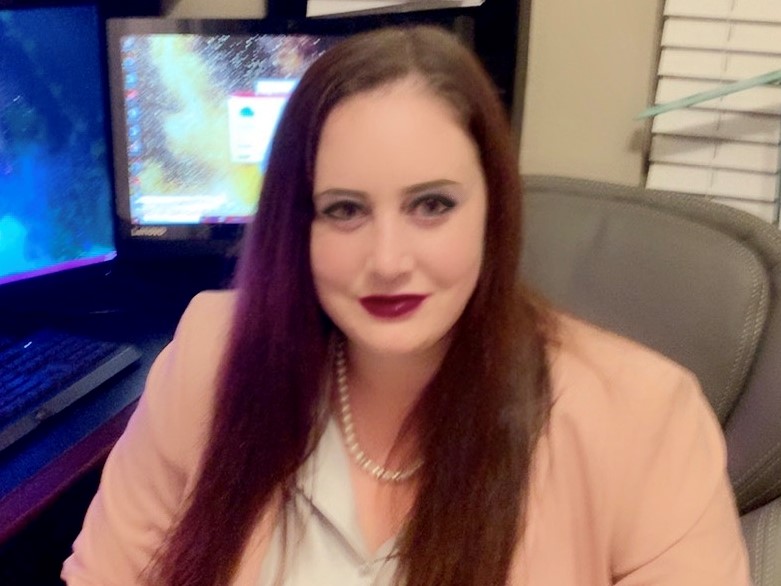ASU professor, family fund congressional internships for public affairs students

Former congressional intern Adrianna Hicks (right) displays an award while standing with School of Public Affairs Professor of Practice Geoffrey Gonsher. Each year Gonsher and his family fund internships at the Phoenix offices of U.S. Sen. Kyrsten Sinema, D-Ariz., where Hicks served in spring 2019, and U.S. Rep. Greg Stanton, D-Ariz. Photo courtesy of Adrianna Hicks
Throughout the more than half century since he received his bachelor’s degree from Arizona State University, Geoffrey Gonsher dedicated his life to public service in a career of unsurpassed variety in Arizona municipal and state government.
Today, 52 years since he was an undergraduate, he and his family are giving ASU students in the School of Public Affairs opportunities to prepare for their own public service careers by personally funding a program that provides paid internships at the Phoenix offices of U.S. Sen. Kyrsten Sinema and U.S. Rep. Greg Stanton, both D-Ariz.
Gonsher is a professor of practice at the School of Public Affairs, part of ASU’s Watts College of Public Service and Community Solutions.
“It occurred to me in about 2018 — I knew 2019 was the 50th anniversary of my first ASU degree — that I wanted to celebrate this phase of my life. I wanted to give back to the university,” he said. “I wanted to do something that directly benefited students, and to benefit the practical application of public service.”
Gonsher also noted that he had been teaching at the School of Public Affairs for 11 years and “wanted to do something to support my school.”
So far, four students — two at Sinema’s Phoenix office and two at Stanton’s — have been or are current interns.
Gonsher’s extensive knowledge of public affairs, gathered from an adult lifetime of public service, made classes he taught more applicable to the world outside the university, said Adrianna Hicks, who interned at Sinema’s office in spring 2019, working 16 hours a week.
Lauren Johnson is currently serving her internship at Rep. Stanton’s Phoenix office. She said she remembers Gonsher’s teaching approach meant relating everything to public policy, including behaviors such as being in class on time.
Lauren Johnson, student in ASU's School of Public Affairs, is a spring 2020 intern at the Phoenix office of U.S. Rep. Greg Stanton, D-Ariz. Photo courtesy of Lauren Johnson
"He was always asking, how does this relate to public policy, how does that, this newspaper article?” Johnson said. “He’d have us read the newspaper every day.”
Gonsher’s own life of service to his state and city offers interns plenty to emulate. He held executive management positions in the administrations of four Arizona governors and two Phoenix mayors. He also headed several state agencies.
Gonsher said one reason he and his family created the internships was his desire to provide opportunities for students to serve the public at the federal level, from here in Arizona.
“We found with many of our students in (the School of Public Affairs) there is a reluctance to leave Phoenix for good reason,” he said. “Families, jobs, some had never been any place else. This program provides the D.C. experience at home.”
Gonsher said the internships are structured to be filled by students who are among the school's very best, with top academic credentials and the ability to represent themselves successfully in the evaluation/interview process.
“They are the top of our top students. We say to them that we recognize their academic and professional credentials and want to give them an opportunity to go further in their careers,” he said.
Asked students how to tailor his class
Hicks, today an ASU senior in public service and public policy with a minor in sustainability, was in her junior year in spring 2019 when she was the first intern sponsored by Gonsher to serve at Sen. Sinema’s office.
“Every conversation I had with Professor Gonsher has been an easy one,” said Hicks, who is to begin study in fall 2020 for a master’s degree in public administration. “He was one of the few professors who really reached out to multiple students to ask how can I help tailor the class to what you want to know.”
At Sinema’s office, Hicks said she learned about professionalism, constituent service and how to diplomatically deescalate situations with occasional angry telephone callers. In addition, she said she received a thorough education of how government functions at the federal level.
Students interested in the internships should keep in mind that working in an elected official’s office doesn’t necessarily equate to interaction with that officeholder — Hicks said she only met Sinema once during the entire time she worked there. But, one will work with a team of people selected to embody the officeholder’s values.
“The opportunity I had catapulted me into other opportunities that I didn’t see as options until I was at Senator Sinema’s office,” she said. “Professor Gonsher’s generosity is a huge bonus. I focused on writing bills, something I improved upon, as well.”
Today, Hicks has an internship at the Arizona Department of Economic Security she said she would not have received had it not been for her time working for Sinema.
Favorite teacher
Johnson is an ASU senior majoring in public policy with an emphasis in criminology, a minor in psychology and a certificate in public administration and management. She is the second intern funded by Gonsher in Rep. Stanton’s office, where she worked this semester.
Gonsher was by far her favorite teacher, Johnson said. Her first class with him was an introduction to public policy her freshman year — the first of three classes where he was her instructor. She said she’s kept in contact with him.
Johnson recalled her senior capstone project under Gonsher’s supervision, which was inspired by ASU’s School of Earth and Space Exploration.
“We broke into groups and we were told we on Earth were moving to a new planet, and we had to come up with a new government and a new way to run things,” she said.
Literally, she said, the sky was the limit.
“We had to create our own constitution, and we were asked what would you take with you in one box to this planet. It was just so creative,” Johnson said. “Each week we had an assignment due and had to construct the laws and the (government) positions.”
Her internship with Rep. Greg Stanton has been more earthbound, but just as rewarding. She said she learned how to handle constituent calls and connect people to the right federal agency. And, she especially reveled in the special feeling of having an email address with a “house.gov” suffix.
Johnson said she was able to work with a wide variety of constituents, from immigrants to veterans to Social Security recipients.
“I was very nervous, but I jumped in with both feet. I wanted experience, I wanted knowledge. I wanted to apply what I was learning to the real world,” she said. “These are real people we’re trying to help.”
Since the novel coronavirus pandemic closed congressional offices, Johnson said that while working at home she had to switch from constituent service to conducting research and updating the office’s resource lists, but it all has combined into a satisfying learning experience.
Johnson said the internship is leading her to think about a career in case management involving substance abuse or homelessness or working in prison reform, as well as continuing her education by going to law school.
“The internship is so worth it. It’s not so much that I learned about federal agencies but interpersonal skills and how to speak with people in a professional culture,” she said.
More funded internships planned
Gonsher said that in the future he hopes more of Arizona’s congressional delegations will participate in the program as Sinema’s and Stanton’s do, and he plans to expand the sponsorship program. An internship in Washington, D.C., is in the planning stages.
Gonsher said he hopes as these interns enter public life after graduation, they become examples to their fellow citizens by devoting their lives to service.
In recent decades, he said, those in government have suffered from uncomplimentary reputations the overwhelming majority do not deserve, though the criticisms remain.
“I spent 40 years of my career telling people that I worked for either a mayor or a governor, and you can imagine what I heard, telling people that,” Gonsher said, noting most people with complaints about their elected officials often lump non-elected personnel into their criticisms.
“But 95% of people in public service are not elected officials. They might be agency directors, as I was, or department heads. All of that is valuable public service,” he said. “When you graduate from our school, your objective may not be to be president of the United States, but to say, I want to be head of the water department for the city of Phoenix or head of procurement for the state of Arizona. This is what I tell my students, that there is vast territory out there for their careers and for their success.”


